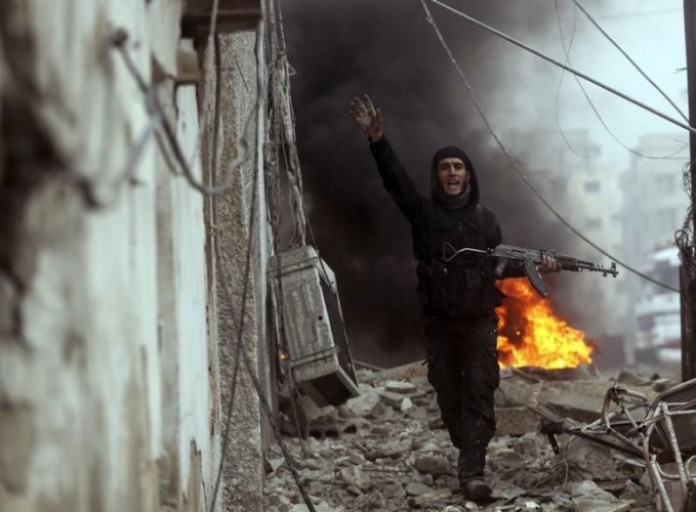
Tens of thousands of people have been killed and millions have been displaced since Syria launched a crackdown on anti-government protesters in March 2011.
What began as a peaceful uprising gradually evolved into a civil war, pitting rebels against government forces.
Syria comprises a sectarian and ethnic mix of Sunnis, Alawites, Kurds, Christians and Druze. Analysts say the country could split into sectarian cantons with Kurds in the north, Alawites along the coast, Druze in the southern hills and Sunnis elsewhere. Or it could plunge into sectarian warfare like Iraq after Saddam Hussein.
The ideal solution, analysts say, would be an internationally sponsored transitional government that would represent all sides.
However, Assad’s strategy has been to cling to power and save his Alawite clan, which has ruled Syria since 1970 and is a minority in a country of 21 million with a Sunni Muslim majority. The Alawite sect is an offshoot of Shi’ite Islam.
Although relatively powerless within the country, the National Coalition for Syrian Revolutionary and Opposition Forces is now recognised as the legitimate representative of the Syrian people by several countries, including the United States, Australia, Britain, France and Turkey, as well as the Arab League and Gulf states. The coalition comprises Syrians in exile and has little influence on the ground. Islamist militias have refused to join it.
Rebels control much of the north and east of the country, including some of eastern Syria’s main oil-producing areas, starving the government of a major source of hard currency.
Kurds in the northeast have enjoyed de facto autonomy for two years, much like their brethren in northern Iraq.
Many fear the conflict, which has been joined by al Qaeda-style fighters, will destabilise Syria’s neighbours. It has already drawn in Lebanon, whose Shi’ite Hezbollah militants are fighting alongside Syrian President Bashar al-Assad’s forces. And fighters from Iraq are supporting different sides of Syria’s war.
Iran and Russia are supporting Assad, and Saudi Arabia, Qatar and Turkey are supporting the rebels.
The United States, France and Britain considered air strikes against Assad’s forces, following a chemical attack in August 2013 that killed hundreds of civilians in rebel-held suburbs of Damascus. The United States accused Assad’s forces of carrying out the attack. The Syrian government denied involvement. U.N. weapons inspectors later said chemical weapons had been used in the attack, but did not say who was responsible.
In September, Assad agreed to work with U.N. inspectors to destroy Syria’s chemical weapons arsenal, averting punitive U.S. action. The deal was supported by both the United States and Russia, prompting new efforts to hold peace talks in Geneva.
Many reports from Syria cannot be independently verified as the authorities restrict rights groups and journalists’ access to the country.
The conflict has displaced millions of people within Syria. Many have been uprooted more than once, as military operations shift and encroach upon former safe havens. Many of the displaced are staying in schools and other public buildings, or with host families.
An estimated half a million people had been displaced by previous crises in Syria, some up to 40 years ago, according to the Internal Displacement Monitoring Centre. They were displaced by Israel’s occupation of the Golan Heights in 1967, the Syrian government’s eviction of Kurds from the northeastern province of al‐Hasakah during the 1970s, and the 1982 crackdown on the city of Hama after a revolt by the Syrian Muslim Brotherhood.
The current violence has forced hundreds of thousands to flee across Syria’s borders to Turkey, Lebanon, Jordan, Iraq and Egypt, but most countries are making it increasingly difficult for Syrians to cross their borders.
Until recently, Syria had also been home to tens of thousands of refugees from Iraq and hundreds of thousands of Palestinian refugees. Many Iraqis have now returned to Iraq, while tens of thousands of Palestinians have left for Lebanon and Jordan.
Since the start of the conflict, the cost of food and fuel has spiralled, while people have lost their homes and livelihoods. The crisis is also taking place in the midst of a lengthy drought, which has badly hit rural communities.
Millions of people in Syria need aid, the United Nations says.
Government restrictions, fighting, roadblocks and criminal activities such as kidnapping have limited aid agencies’ ability to reach parts of the country. Several aid workers have been killed while delivering aid.
People in rebel areas are among the most vulnerable. The government does not allow humanitarian agencies to deliver aid across international borders, although it has approved the delivery of some aid from Damascus to opposition areas. Still, the journey from Damascus is dangerous and involves passing many checkpoints manned by either government or opposition forces.
The fighting forced the U.N. World Food Programme (WFP) to withdraw its staff from several cities, and has delayed food deliveries. The few government-approved aid agencies are stretched to the limit, including WFP’s main partner, the Syrian Arab Red Crescent.
U.N. agencies distribute much of their assistance through local aid agencies and the International Committee of the Red Cross (ICRC). The United Nations has thousands of staff in the country – the majority are Syrian and work for the U.N. Relief and Works Agency (UNRWA), which helps Palestinian refugees.
WFP coordinates aid delivery through several local agencies including the Syrian Arab Red Crescent, which has been given access to conflict areas to distribute aid and evacuate the wounded and others in need.
Health services have been severely affected by the violence. Hospitals have been closed, damaged and sometimes occupied by security forces, and many healthcare workers cannot get to work because of security problems and inaccessible roads.
Doctors say they have been targeted in bombing campaigns and risk death, detention and torture to treat the wounded, whether civilians or fighters. Many have left or been killed.
Furthermore, the government has stopped paying the salaries of medical staff in rebel areas, forcing hospitals and other health centres to rely increasingly on medical students and other volunteers.
Many of the main drug makers in Syria have closed down, causing severe shortages of medicines, the World Health Organization (WHO) said.
Patients often have to make the gruelling journey across the border into neighbouring countries for treatment, resulting in many deaths, Medecins Sans Frontieres (MSF) said.
MSF does not have government permission to work in Syria and has focused most of its work on refugees in Lebanon, Jordan and Turkey. However, it has set up field hospitals in rebel areas in Syria.
SECTARIAN CONFLICT CROSSES BORDERS
Syria’s turmoil is dragging its neighbours into an increasingly sectarian confrontation between Shi’ites supporting Assad and Sunnis backing the Syrian rebels.
Lebanon’s many religious groups – including Sunni and Shi’ite Muslims, and Maronite and Orthodox Christians – are deeply divided over Syria’s conflict. Outside central Beirut there have been clashes, especially in the coastal cities of Sidon and Tripoli, the southern districts of the Lebanese capital and the eastern Bekaa Valley.
Fighters from Lebanon’s Shi’ite militant group Hezbollah have played a significant role in helping Assad recapture border towns from Sunni rebels.
Bekaa Valley towns loyal to Hezbollah have come under rocket fire by suspected rebel fighters whose own ranks are swelled by Lebanese Sunnis. Some experts fear that pro-Assad or rebel fighters may move the conflict deeper into Lebanese territory.
Lebanon is also struggling to cope with a huge Syrian refugee population, and the numbers are likely to rise dramatically.
The authority of Lebanon’s government and institutions has been undermined by the conflict, leaving the country vulnerable to a swift collapse into violence, former U.N. special coordinator Michael Williams told Britain’s parliament in July 2012. «I am concerned that Lebanon could – I pray it will not – descend into widespread civil strife in a matter of hours,» he said.
Political divisions over the conflict are one reason why Lebanon has postponed elections until late next year.
In Iraq, a wave of sectarian attacks in Shi’ite and Sunni areas, aggravated by the Syrian fighting, has put the country’s fragile ethnic and confessional makeup under severe strain.
Sunni al Qaeda fighters from Iraq are joining Islamist rebels in Syria, and Shi’ite militias who once fought alongside U.S. troops in Iraq are crossing over the border to support Assad’s forces.
Baghdad’s Shi’ite-dominated government says it supports no side in the war and is calling for a negotiated settlement. Western powers say Iraq allows Iranian flights carrying weapons to Assad’s forces through Iraqi airspace, a charge Baghdad denies.
Tensions with Turkey have also grown as Syria’s civil war has spilled into its border areas. It has asked for Western missiles to be stationed along the border, fearing the Syrian government’s missiles and chemical weapons arsenal. It is also managing a difficult situation in its border areas used by Syrian rebels as off-duty resting places. This is causing local tensions because they are also home to people directly related to President Assad’s Alawite sect.
Jordan, concerned about Sunni extremist fighters so near its border, has asked the United States to station troops, warplanes and missiles on its soil.
Israel is also worried about the growing influence of Sunni extremists on the Syrian side of its border, as well as the presence of Lebanon’s Hezbollah fighters in Syria. It has carried out air strikes on Syria in an attempt to rein in Hezbollah.
Egypt introduced visa requirements for Syrians in July 2013, after local media accused Syrian Islamists of joining deadly clashes between supporters of toppled Egyptian President Mohamed Mursi, and the army who had ousted him. They previously only needed a passport to enter Egypt.
The large numbers of Syrian refugees in Lebanon, Turkey and Jordan are causing tensions and affecting the local economies.
There are dozens of rebel groups fighting for different reasons, although they all want to defeat Assad as a starting point. Some are relatively moderate, but the most powerful are extremist Islamist groups.
The extremists have been joined by thousands of foreign fighters from many countries including Libya, Iraq, Chechnya, Tunisia, Lebanon, France and Britain, and they are well trained and well armed.
The Islamic State of Iraq and al-Sham (ISIS), a new al Qaeda franchise announced by the head of the global network’s Iraq leader, has worked to cement power in rebel-held territories of northern Syria.
ISIS has subsumed the once dominant Nusra Front that had resisted calls by foreign radicals to expand its scope beyond the Syrian revolt to a more regional Islamist mission.
ISIS is believed to be buying up land and property in some parts of Idlib and Aleppo provinces, and they also have tried to control supplies of wheat and oil in other rebel areas.
Reports of more moderate Syrian rebels appearing to make money off the back of the conflict boosted support for the extremists, who are sometimes perceived to be less corrupt.
Residents of rebel-held territories said the extremists were better organised and had set up administrative councils to keep electricity running and food supplies coming in.
However, protests against the groups have been growing as ISIS units have imposed stricter interpretations of Islamic law, and filmed themselves executing members of rival rebel groups whom they accuse of corruption and beheading those they say are loyal to Assad.
There have been violent clashes between ISIS and other rebel groups.
The political opposition in exile – the Syrian National Coalition – has only limited influence on the myriad rebel groups.
Western powers and much of the Arab world have slammed Assad’s bloody crackdown and imposed economic sanctions. Some – including Washington – are offering the rebels non-lethal support.
The White House said in June 2013 that it wanted to arm rebels and would vet them to make sure weapons did not go to extremist groups. However, this has not yet been agreed by Congress.
Some Western leaders – including U.S. President Barack Obama – said they were obliged to launch a punitive strike against Assad’s forces, following a major poison gas attack in August 2013 which they blamed on Assad. The Syrian government said rebels carried out the chemical attack.
Russia and China have repeatedly vetoed U.N. Security Council resolutions critical of Damascus. China is uneasy with anything that legitimises international involvement in what it sees as the domestic affairs of countries.
In August 2012, the U.N. General Assembly passed a resolution demanding that Assad resign.
The Syrian government’s closest allies – Iran and the pro-Iran Lebanese movement Hezbollah – for the most part have offered unconditional backing, saying Syria is the victim of a foreign conspiracy.
Turkey, once an ally of Assad, is now a leader in international calls for him to quit.
The Arab states at the forefront of efforts to topple the government – Saudi Arabia and Qatar – aim to remove a pro-Iranian government, not encourage a transition toward a more democratic one, International Crisis Group says.
As in the Tunisian and Egyptian Arab Spring uprisings, Syrian citizens were protesting lack of freedom and opportunity, impunity for security forces, and corruption that has enriched the elite while one-third of Syrians live below the poverty line.
The unrest began in the southern city of Deraa when security forces killed three protesters, according to local residents. On March 20, 2011, crowds set fire to the headquarters of the ruling Baath Party in Deraa.
Anti-government demonstrations continued despite further deaths. Security forces and gunmen loyal to Assad killed at least 100 protesters in a single day in April, rights groups said.
The government tried to placate the protesters by giving in to one of their key demands – ending 48 years of emergency rule. It also abolished state security courts and allowed citizens to protest peacefully. But these concessions did not end the demonstrations, which, by May, had spread across the country.
That August, the Free Syrian Army was formed by army deserters. It said it would work with the demonstrators to bring down the government.
An opposition umbrella group – the National Co-ordination Committee – was formed in September. The Syrian National Council was formed in October, comprising seven opposition groups.
In February 2012, two foreign journalists were killed in Homs city, which had come under heavy bombardment.
In April 2012, a U.N.-backed ceasefire came into effect. President Assad’s security forces and opposition fighters both agreed to the truce brokered by former U.N. Secretary-General Kofi Annan, but U.N. observers later reported violations by both sides.
On May 7, Syria held multi-party elections as part of a political reform package agreed to by Assad as a gesture towards those who want an end to his family’s four-decade grip on power. The opposition denounced the poll as a sham.
Later that month, at least 108 people were killed – including many children – in attacks in the region of Houla. Assad later condemned the massacre.
In June, U.N. peacekeeping chief Herve Ladsous said the uprising had grown into a full-scale civil war. Soon afterwards, the violence forced U.N. observers to suspend operations.
In July 2012, rebels seized control of parts of Syria’s borders and bombed the government’s security headquarters in Damascus, killing Assad’s powerful brother-in-law and wiping out much of Assad’s command structure.
That month, the International Committee of the Red Cross said the fighting had become so widespread that the conflict was in effect a civil war. This change in status officially makes the combatants subject to the Geneva Conventions, which set down the rules of war.
In August, Annan stepped down as U.N.-Arab League peace envoy, describing his position as «impossible». He was replaced by Algerian diplomat Lakhdar Brahimi.
In October, a U.N.-brokered ceasefire during the Islamic holiday of Eid al-Adha broke down as the government continued attacks.
The National Coalition for Syrian Revolutionary and Opposition Forces was formed in November. This opposition in exile includes the Syrian National Council and is recognised by many countries as the legitimate representative of the Syrian people.
See also:


























